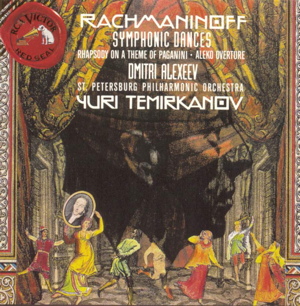
Sergey Rachmaninov (1873–1943)
Aleko Overture (1892)
Rhapsody on a Theme of Paganini, Op. 43 (1934)
Symphonic Dances, Op. 45 (1940)
Dmitri Alexeev (piano)
St Petersburg Philharmonic Orchestra/Yuri Temirkanov
rec. 1992, Blackheath, London, UK
Presto CD
RCA 09026627102 [63]
Presto chose well in breathing new life into this disc with all its commanding strengths. It first surfaced in the early 1990s. Caucasus-born Temirkanov (b. 1938) is well under the skin of this music. He responds to every seething, supple texture. The music’s swooning and drama are capitalised on and revelled in. Deeply enjoyable stuff. The notes, in English only, are refreshingly readable, factually stimulating and not steeped in cloying academic language. They are by Steven Ledbetter.
Temirkanov made these recordings in London. Recording quality by Jay Saks, Tony Faulkner and Paul Zinman is an exemplary companion to the musicians’ work. A decade later Temirkanov made another series tapping largely Russian repertoire. This has been brought to us by Signum and includes a properly lauded Sheherazade. His work in the one-time Soviet Union can be glimpsed through a Brilliant/Historical Russian Archives box. It’s good to hear Dmitri Alexeev, of whom we hear too little nowadays. For this listener he first asserted himself in the delightful Classics for Pleasure disc of the Shostakovich piano concertos but also made his mark with Medtner and Scriabin.
The early, compact and diminutive Aleko overture is quite Tchaikovskian; Rachmaninov was a devout admirer of the older composer. I should add that Temirkanov’s winningly bright and eager way with Tchaikovsky can be heard in extenso in the Royal Philharmonic Orchestra’s cycle, again with RCA/BMG. The overture precedes two works written in the 1930s by Rachmaninov in the USA. The first of these is the Rhapsody on a Theme of Paganini which, it should be remembered, came after the Fourth Piano Concerto. Alexeev meets head-on the work’s bejewelled fantasy, breathiness and iron and velvet chops. It’s a strange coupling in this company … less strange – more fresh and stimulating. The Variations are lavishly tracked with one for each variation; a total of no fewer than 25 if you include the theme.
The most substantial work here is the three-movement Symphonic Dances. No stranger to this score (DVD; Warner CD), Temirkanov responds to its crackling propulsion and sheer gelignite. It’s a work that always struck home with me as more symphonic than balletic. Soused in drama and sighs, it comes over as a full-on counterpart to Tchaikovsky’s Francesca da Rimini. Keep your fingers crossed for the issue of Yuri Ahronovitch’s overpowering LSO version of the Tchaikovsky from the late 1970s in London. The story was in fact channelled by Rachmaninov in one of his three completed operas. The three movements of the Dances are capped in the immersively resonant gong-crash with which the work and this performance closes. If you hanker after a more extreme and virile version then dig out the almost original vinyl version conducted by Kondrashin (EMI ASD 2488). Beware later digital transfers of that LP which shave off the final tam-tam resonance in a truncating bowdlerisation that beggars belief. That brutal snipping of the tape serves to betray Kondrashin, his Bolshoi forces and the original Melodiya engineers from the 1960s. Temirkanov more than makes amends.
Rob Barnett
Help us financially by purchasing from



















